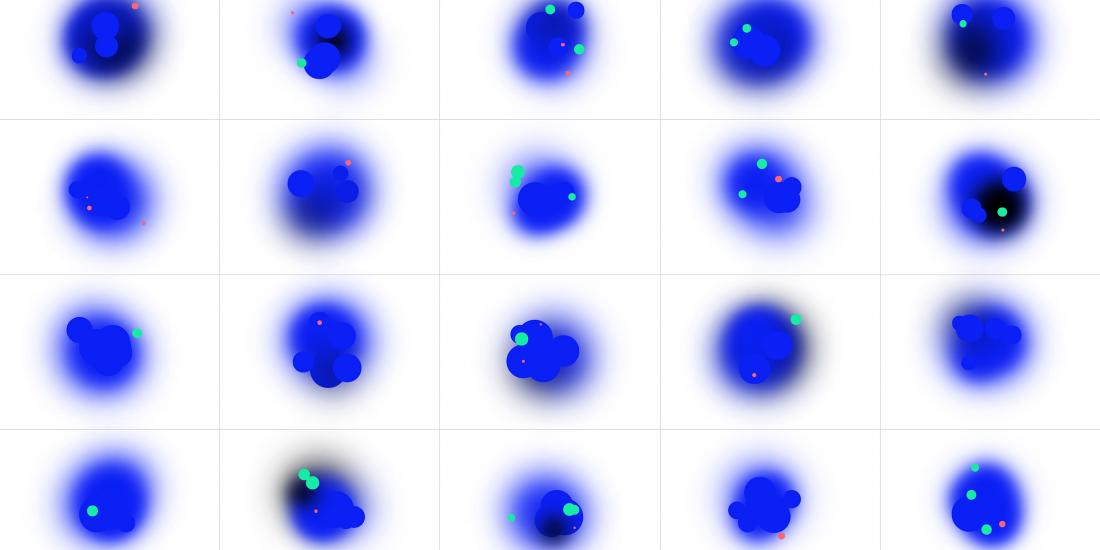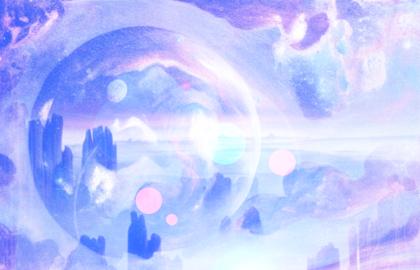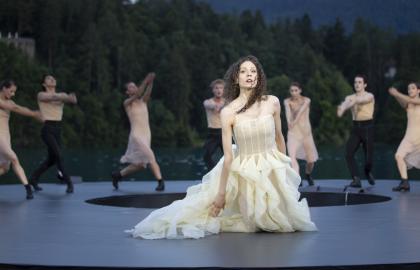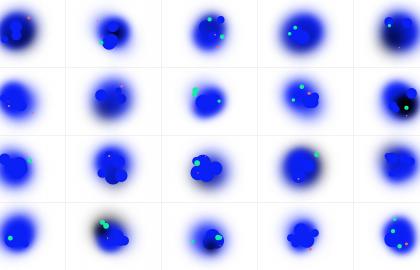The conference highlighted the need for a plurality of voices on a subject that has transcended the domain of computer science and has permeated every aspect of our society. Critical views on AI pointed out the loss of privacy, the biases embedded in the design of decision-making algorithms and the potential for social manipulation as some of its major threats. Conversely, other speakers stressed the potential of Machine Learning and other techniques for creativity, the improvement of living conditions for people with functionally diverse bodies, and the development of smart cities.
What started as a lively debate continues on the website of The Future of Living as an ongoing conversation. The Living Document, an interactive interface that collects different views on AI, invites users to evaluate them and contribute their own. As artificial intelligence technologies become embedded in our daily interactions with computers and information networks, keeping an open, plural and participatory dialogue is more needed than ever.
Panel 1
Keynote – Oriana Persico & Salvatore Iaconesi, Artist Duo Art is Open Source
Discussing the challenges and opportunities in conceiving AI systems as co-creators alongside human artists. What role should AI play in the creative process? Keynote by Salvatore Iaconesi and Oriana Persico from Artist Duo ART IS OPEN SOURCE (AOS).
Mikael Fock
What role should AI play in the creative process? SH4D0W – A 3D Theater Performance with Live Actors and A Live Improvising AI as the Protagonist. By Mikael Fock, CEO and Artistic Director of The Culture Yard, Denmark.
Anna Ridler
What role should AI play in the creative process? Working with AI and Machine Learning as part of the artistic process and creating systems of knowledge. By Anna Ridler, artist and researcher.
Špela Petrič
What role should AI play in the creative process? A scientific understanding of the world through investigating the relationship between people and plants, Smart Hybrid Forms and vegetal otherness. By Špela Petrič, new media artist and researcher at Vrije Universiteit Amsterdam.
Q&A on human+AI creativity in the arts
Discussing the challenges and opportunities in conceiving AI systems as co-creators alongside human artists. What role should AI play in the creative process? Moderated by Pau Alsina, Director of the Art, Science and Technology program of the Open University of Catalonia.
Panel 2
Keynote – Bruce Sterling
What do we expect from AI to be acceptable and empowering for our better future? Art and Artificial Intelligence, a science-fiction story? AI and the future of mankind through the eyes of Bruce Sterling, author, journalist, editor and critic.
Vladan Joler
What do we expect from AI to be acceptable and empowering for our better future? ‘Anatomy of an AI system’ created by artist Vladan Joler who defines himself as a critical cartographer. By Vladan Joler, academic, researcher and artist.
Juan C. Moreno
What do we expect from AI to be acceptable and empowering for our better future? Why do we have brains? Creating Interactive robotics to promote neural recovery after a stroke or spinal damage. AI as living machines instead of algorithms. By Juan C. Moreno, Director of the Neural Rehabilitation Group at Cajal Institute in Madrid.
Matei Mancas
What do we expect from AI to be acceptable and empowering for our better future? AI & Creativity, examples of artificial creativity. From artworks generated from ant-swarm algorithms to drawing robots and co-creation between humans and AI. By Matei Mancas, Researcher in the field of Computational modelling of attention at UMons.
Marek Havrda
What do we expect from AI to be acceptable and empowering for our better future? AI Policy & Social Impacts. Introducing the concept of Human Beneficial AI. Algorithms in 2021: Transformers, LLM, GPT-3, Codex, Ocado and Allcyte. What is the impact of AI on humans and society? Addiction, deskilling, social manipulation, erosion of privacy, surveillance. Ways to ‘fix’ AI through technology. Asking the right questions: AI safety research, Ethical Impact Assessment and Open Impact Assessment Platform. Whose values are reflected in the algorithms? By Marek Havrda, Director of AI Policy & Social Impacts at GoodAI.
Q&A
Making the current models of data gathering and processing more transparent and clearly understandable. What do we expect from AI to be acceptable and empowering for our better future? Q&A moderated by Marc Pons, Director of Andorra Recerca + Innovacio.
Live connection with Hack-à-Deux
Live connection with the Hack-à-deux which is the sister event of The Future of Living conference, taking place at Bozar on October 19th and 20th, 2021. The event consists of pairing artists and computer scientists, engineers, or curators in teams that will develop a project related to the subject “Living with AI, our nearest neighbour.”
Panel 3
Keynote – Gerfried Stocker
Keynote of Gerfried Stocker, Artistic Director of Ars Electronica. The Future of Living: What is the future? What will the Future be and what Future do we want to happen for us? Speaking about the concept of AI singularity, the point where AI and machines take over and evolve beyond our control.
Christoph Schommer
Facing the challenges of creating a better future for our societies and ecosystems with the help of artificially intelligent systems. What future do we want with AI? By Christoph Schommer, Machine Learning Scientist from the Université of Luxembourg.
Marko Grobelnik
Facing the challenges of creating a better future for our societies and ecosystems with the help of artificially intelligent systems. What future do we want with AI? AI & Future, a technical approach. What are the futures we need to operate with? Wide range of today’s Strategic Foresight methods based on creativity, expertise, interaction and evidence. A definition of AI: from the literature to the OECD definition of AI. By Marko Grobelnik, AI Researcher and Digital Champion of Slovenia.
Eszter Dávida
Facing the challenges of creating a better future for our societies and ecosystems with the help of artificially intelligent systems. What future do we want with AI? Challenges and integration of AI in Urban planning. Creating data spaces for data-driven supporting technologies for the Green Deal Transition. Combining digital with vernacular knowledge. Data-driven participatory urban planning. By Eszter Davida, urbanist, at CENTRE-KEK.
Xavier Troussard
Facing the challenges of creating a better future for our societies and ecosystems with the help of artificially intelligent systems. What future do we want with AI? The New European Bauhaus and AI. Creating a future living now. Responding to the climate urgency and the pandemic urgency: bringing people together in a participatory way through digital technologies. By Xavier Troussard, Head of the New European Bauhaus Unit – Joint Research Centre at the European Commission.
Q&A
Facing the challenges of creating a better future for our societies and ecosystems with the help of artificially intelligent systems. What future do we want with AI? Q&A moderated by Enzo Maria Le Fevre, Project Manager at the EU Commission DG DIGIT.
Panel 4
Keynote – Dariusz Jemielniak & Aleksandra Przegalińska
General trends in AI as a collaborative technology: emerging technologies, collaborative society, peer production, open data pools… Implementing AI into business strategy. Bots and us. Cobots. Human machine collaboration over automation. Examples of Collaborative Technologies developed during the COVID-19 pandemic: 3D-printed masks, Wearable sanitizers. Social responsibility of AI. Keynote by Dariusz Jemielniak, full professor and head of Management in Networked and Digital Environments (MINDS) department, Kozminski University and Aleksandra Przegalińska, Vice-rector responsible for International Cooperation and ESR+ Associate Professor at Kozminski University.
Hack-à-Deux - Kristjan Jansen and Guillem Alenyà
Showcasing the work of three teams of artists and AI experts who have developed a multidisciplinary approach to the challenges presented by AI during a 2-days Hackathon at Bozar. Presentation by Kristjan Jansen, UX Designer, engineer and educator.
Hack-à-Deux - Dries Depoorter
Showcasing the work of three teams of artists and AI experts who have developed a multidisciplinary approach to the challenges presented by AI during a 2-days Hackathon at Bozar. Presentation by Dries Depoorter, Belgian artist (Installations, apps, games).
Hack-à-Deux – Laura Colmenarres Guerra, Alex Verhaest and Bohdana Kohorod
Showcasing the work of three teams of artists and AI experts who have developed a multidisciplinary approach to the challenges presented by AI during a 2-days Hackathon at Bozar. Presentation by Laura Colmenarres Guerra (artist), Alex Verhaest (filmmaker) and Bohdana Kohorod (artist and independent researcher).
Hack-à-Deux - Q&A
Showcasing the work of three teams of artists and AI experts who have developed a multidisciplinary approach to the challenges presented by AI during a 2-days Hackathon at Bozar. Q&A moderated by Anna Carreras, creative coder and digital artist.



